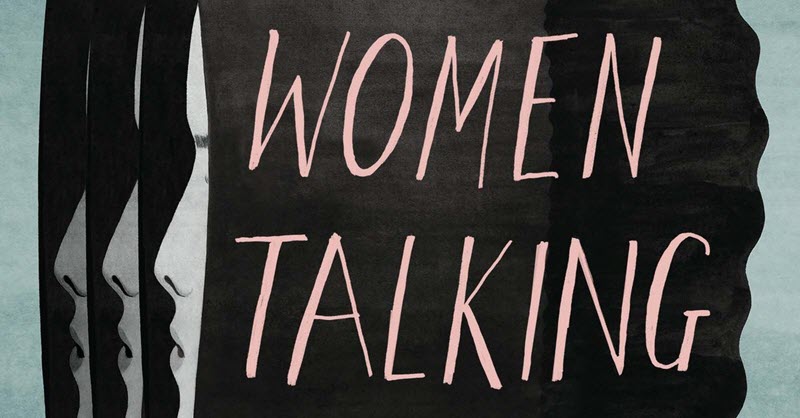| By Catherine DiMercurio |
Miriam Toews’s Women Talking is rooted in historical events. Toews describes the novel as an “imagined response” to those events. The crimes perpetrated against a community of Mennonite women living in a colony in Bolivia came to light in 2011, during the trial of the men accused of anesthetizing and raping more than 130 women between 2005 and 2009. The victims ranged in age from three to sixty-five years. They were sometimes violated by family members, sometimes by other men in the colony. Drugged with a bovine anesthetic that a Mennonite veterinarian from another colony had modified into a spray formulation, the women would wake to bloodied, stained sheets. They suffered from headaches and extreme lethargy, contracted venereal diseases, became pregnant, and would sometimes wake during the attacks but be unable to move or cry out. For years, church elders discounted such experiences, blaming “wild female imaginations.” The attacks were also characterized as “ghost rapes,” mysterious events that could not be explained. Toews, who was living in Toronto in 2011 when she heard about the trial, has explained in interviews that her need to write about the women stemmed from her connection to them. Like the women living in the colony in Bolivia, Toews is descended from the Molotschna colony of Mennonites.
Her novel imagines how the women in the colony might have reacted after the men were handed over by colony leaders to the local police. The fictional women are given two days to decide whether they will forgive the men or leave the colony. The plot of the book and Toews’s deft treatment of the material have caused the novel to rise to prominence, particularly in the wake of the #MeToo movement. As a review in The Guardian indicates, Women Talking inspired the hashtag #MennoniteMeToo. The novel has been praised for the beauty of Toews’s prose, for the dark humor she interweaves into the somber, devastating topic, and for the way the work explores violence, punishment, justice, forgiveness, and faith.
The work is structured in a rather unconventional manner. Though the title clearly emphasizes the prominence of women’s voices, it is narrated by a man who has been asked to record the women’s deliberations as they attempt to decide, collectively, on a course of action. The man, August Epp, explains that he is taking minutes because the women are illiterate.
What is striking to me about the novel is the way Toews treats the ideas of language and communication. As August explains, the women cannot read or write. Further, the only language the women are taught and in which men communicate with them is Low German. August states:
A translation note: The women are speaking Plautdietsch, or Low German, the only language they know, and the language spoken by all members of the Molotschna Colony – although the boys of Molotschna are now taught rudimentary English in school, and the men also speak some Spanish. Plautdietsch is an unwritten medieval language, moribund, a mishmash of German, Dutch, Pomeranian and Frisian. Very few people in the world speak Plautdietsch, and everyone who does is Mennonite. I mention this to explain that before I can transcribe the minutes of the meetings I must translate (quickly, in my mind) what the women are saying into English, so that it may be written down.
The women, then, are only able to communicate within their community, and only orally. As they face expulsion from the colony if they refuse to forgive the men who raped them night after night, for years, they must contemplate the fact they would be unable to communicate with virtually anyone in the outside world, where Spanish or English would be the languages most likely to be spoken. In this way, language is used as a powerful, brutal tool to silence the women. Another element of silencing the women is that they were not permitted to be present at the trial. Their male family members represented them as accusers.
Yet, in Women Talking, women from two impacted families gather in a hayloft, with August, and communicate about what happened. They attempt to come to a consensus about what action they will take. They have few options: do nothing; stay and fight; or leave. At the same time, it is plain that these options are insufficient. It is plain that the trauma is too great, that grief and rage hemorrhage from the victims like blood from open wounds. Consider the character of Salome: she attacks one of the accused rapists with a scythe after she learns that her three-year-old daughter has contracted a sexually transmitted disease after being violated, and then was denied access to medical treatment by the community’s bishop.
Though Toews’s novel is about many things, it would be difficult to ignore the way it is about language, and the way language is used. Just as language is employed by the patriarchal community to constrain the women, it is also taken back by women as a way of bringing to light, at least among themselves, what has happened to them. Many reviews of the novel (including this NPR review) discuss the significance of the fact that the narrator of the novel is a man. Significantly, though, he is present because a woman has asked him to be there to record their words. He reflects the desire of the women to exert control over language, their desire for a shred of agency.
The work is a difficult but important one. It poses more questions than it answers, but it underscores the importance of having the conversation – out loud, on paper, with others. It stresses that language must be used in every possible way, because no one should be erased by an inability to communicate their experiences.



